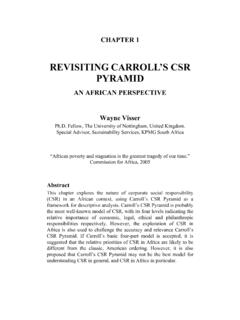Transcription of CSR 2.0: The evolution and revolution of corporate social ...
1 ~ CHAPTER 21: CSR ~ The evolution and revolution of corporate social responsibility By Wayne Visser In: Responsible Business: How to Manage a CSR Strategy Successfully Edited by Manfred Pohl and Nick Tolhurst (Wiley, 2010) The Rise and Fall of CSR corporate social responsibility (CSR) has been debated and practiced in one form or another for more than 4,000 years. For example, the ancient Vedic and Sutra texts of Hinduism and the Jatakas of Buddhism include ethical admonitions on usury (the charging of excessive interest) and Islam has long advocated Zakat, or a wealth taxi. The modern concept of CSR can be more clearly traced to the mid-to-late 1800s, with industrialists like John H.
2 Patterson of National Cash Register seeding the industrial welfare movement and philanthropists like John D. Rockerfeller setting a charitable precedent that we see echoed more than a hundred years later with the likes of Bill Gatesii. Despite these early variations, CSR only entered the popular lexicon in the 1950s with R. Bowen s landmark book, social Responsibilities of the Businessmaniii. The concept was challenged and strengthened in the 1960s with the birth of the environmental movement, following Rachel Carson s critique of the chemicals industry in Silent Springiv, and the consumer movement off the back of Ralph Nader s social activism, most famously over General Motors s safety recordv.
3 The 1970s saw the first widely accepted definition of CSR emerge Archie Carroll s 4-part concept of economic, legal, ethical and philanthropic responsibilities, later depicted as a CSR pyramidvi - as well as the first CSR code, the Sullivan Principles. The 1980s brought the application of quality management to occupational health and safety and the introduction of CSR codes like Responsible Care. In the 1990s, CSR was institutionalised with standards like ISO 14001 and SA 8000, guidelines like GRI and corporate governance codes like Cadbury and King. The 21st century has been mostly more of the same, spawning a plethora of CSR guidelines, codes and standards (there are more than 100 listed in The A to Z of corporate social responsibility ), with industry sector and climate change variations on the theme.
4 Why is all this potted history of CSR important in a discussion about the future? Well, first, it is to realise that CSR is a dynamic movement that has been evolving over decades, if not ~ CHAPTER 21: CSR : THE evolution AND revolution OF corporate social responsibility ~ Responsible Business: How to Manage a CSR Strategy Successfully Edited by Manfred Pohl & Nick Tolhurst (Wiley, 2010) centuries. But second, and perhaps more importantly, it is to acknowledge that, despite this seemingly impressive steady march of progress, CSR has failed. Furthermore, we are witnessing the decline of CSR, which will continue until its natural death, unless it is reborn and rejuvenated.
5 That is a bold claim, so it deserves substantiation. CSR has undoubtedly had many positive impacts, for communities and the environment. Yet, its success or failure should be judged in the context of the total impacts of business on society and the planet. Viewed this way, on virtually every measure of social , ecological and ethical performance we have available, the negative impacts of business have been an unmitigated disaster, which CSR has completely failed to avert or even substantially moderate. A few facts will suffice to make the point: our global ecological footprint has tripled since 1961; WWF s Living Planet Index shows a 29% species decline since 1970; and 60% of the world s ecosystems have been degraded, according to the Millennium Ecosystem Assessment.
6 We do not fare much better on social issues: according to the UNDP, billion people still live on less than $2 a day; 1 billion have no access to safe water; and billion lack access to sanitation. What about ethical issues? Not much good news there either. In 2007, 1 in 10 people around the world had to pay a bribe to get services. Before Enron collapsed in fraudulent disgrace in 2001, Fortune magazine had voted it one of the 100 Best Companies to Work for in America in 2000. More worrying still, Enron had all the CSR codes, reports and practices you would expect from a socially responsible company.
7 Houston, we have a problem! The Failure of CSR Why has CSR failed so spectacularly to address the very issues it claims to be most concerned about? This comes down to three factors the Triple Curse of Modern CSR, if you like: Curse 1: Incremental CSR One of the great revolutions of the 1970s was total quality management, conceived by American statistician W. Edwards Deming, perfected by the Japanese and exported around the world as ISO 9001. At the very core of Deming s TQM model and the ISO standard is continual improvement, a principle that has now become ubiquitous in all management system approaches to performance.
8 No surprise, therefore, that the most popular environmental management standard, ISO 14001, is also build on the same principle. There is nothing wrong with continuous improvement per se. On the contrary, it has brought safety and reliability to the very products and services that we associate with modern quality of life. But when we use it as the primary approach to tackling our social , environmental and ethical challenges, it fails on two critical counts: speed and scale. The incremental approach of CSR, while replete with evidence of micro-scale, gradual improvements, has completely and utterly failed to make any impact on the massive sustainability crises that we face, many of which are getting worse at a pace that far outstrips any futile CSR-led attempts at amelioration.
9 Curse 2: Peripheral CSR Ask any CSR manager what their greatest frustration is and they will tell you: lack of top management commitment. This is code-speak for saying that CSR is, at best, a peripheral function in most companies. There may be a CSR manager, a CSR department even, a CSR report and a public commitment to any number of CSR codes and standards. But these do little to mask the underlying truth that shareholder-driven capitalism is rampant and its obsession with short-term financial measures of progress is contradictory in almost every way to the long-term, stakeholder approach needed for high-impact CSR.
10 ~ CHAPTER 21: CSR : THE evolution AND revolution OF corporate social responsibility ~ Responsible Business: How to Manage a CSR Strategy Successfully Edited by Manfred Pohl & Nick Tolhurst (Wiley, 2010) The reason Enron collapsed, and indeed why our current financial crisis was allowed to spiral out of control, was not because of a few rogue executives or creative accounting practices, it was because of a culture of greed embedded in the DNA of the company and the financial markets. Joel Baken goes so far as to suggest that companies are legally bound to act like psychopathsvii. Whether you agree or not (and despite the emerging research on responsible competitiveness ), it is hard to find any substantive examples in which the financial markets reward responsible behaviour.






